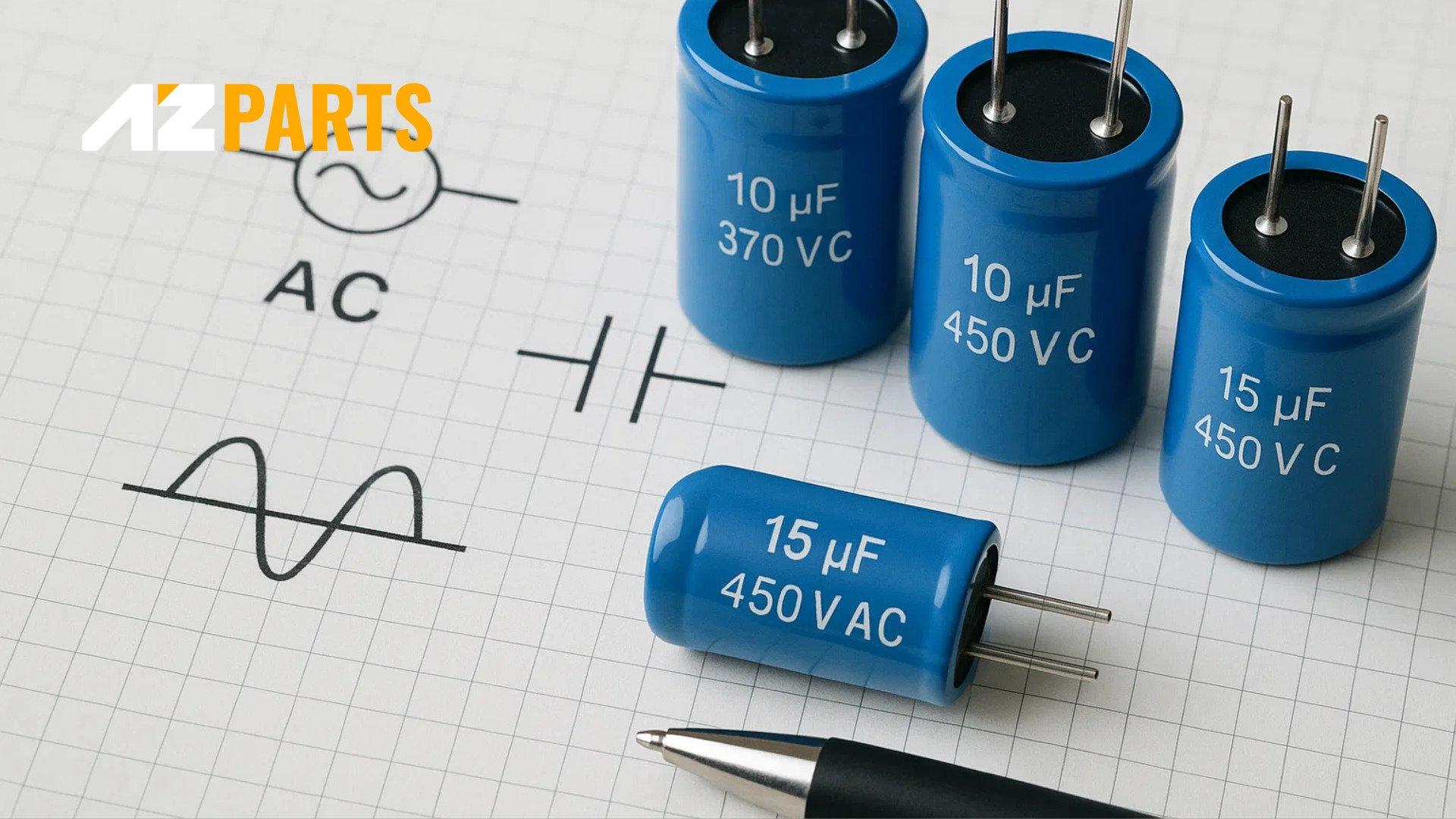Repair help
Why Is My Air Conditioner Blowing Hot Air? How to fix?
AZparts Team
Updated on July 9, 2025
10 min read
Is your air conditioner running but blowing out warm or hot air instead of cool air as it should? This is a fairly common issue, especially during hot days when the demand for cooling is high. Many people assume the unit is seriously damaged, but in reality, the problem often comes from simple causes like incorrect settings, a dirty air filter, or low refrigerant levels. In this article, let AZParts help you uncover the reasons why your air conditioner is blowing hot air, along with practical solutions and usage tips to help you avoid this issue in the future.
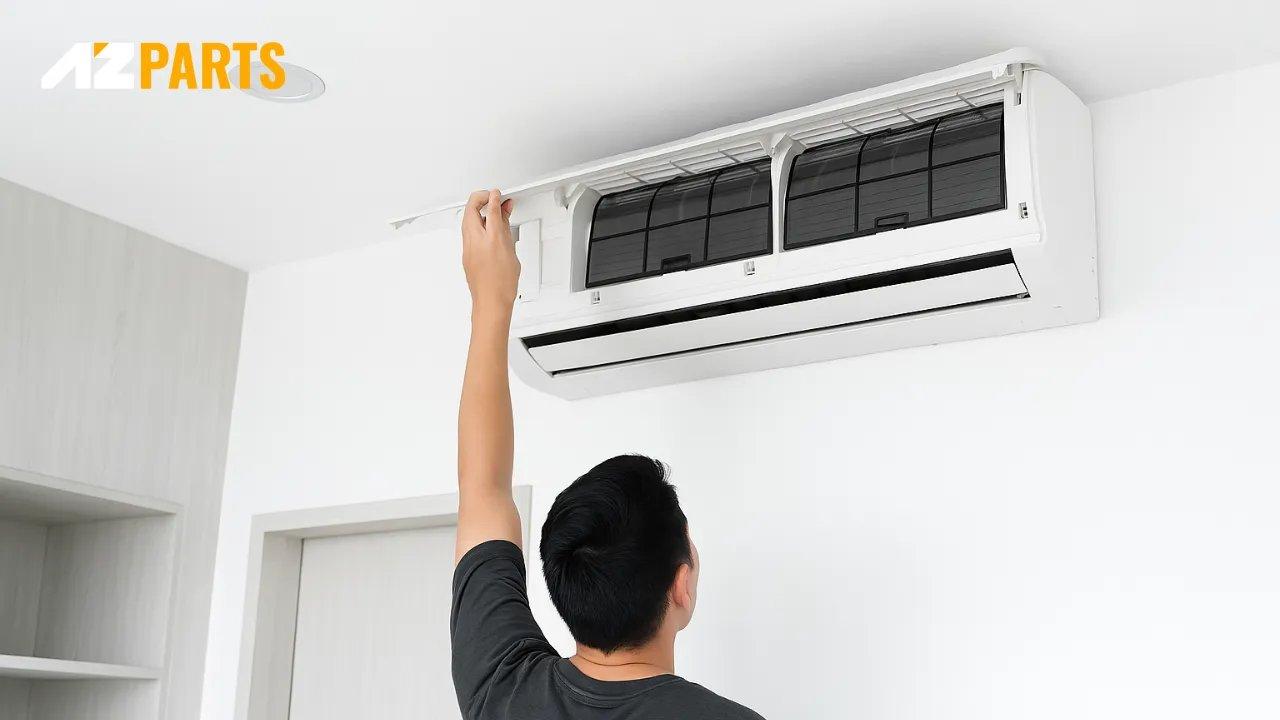
1. How Does An Air Conditioner Work?
An air conditioner works based on the principle of heat exchange and the process of compressing and expanding refrigerant gas to cool the air in a room. This process takes place in four main steps that help maintain a continuous and efficient flow of cool air.
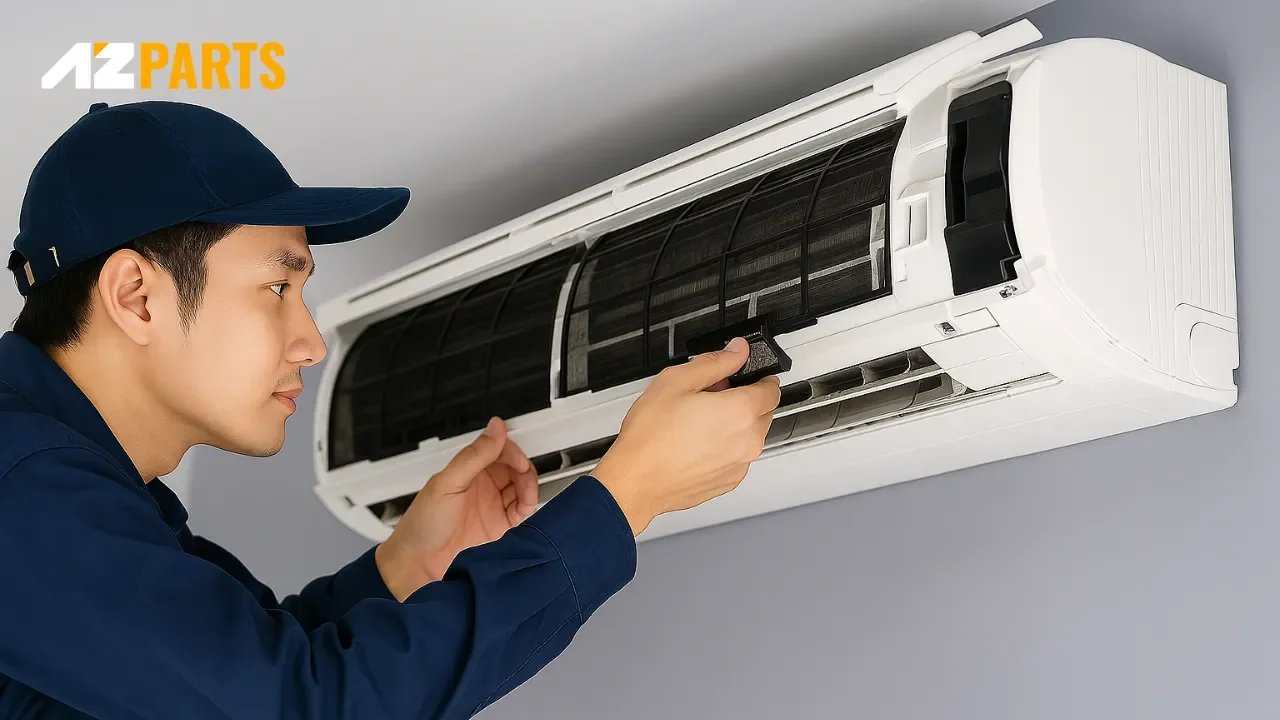
An air conditioner works by using heat exchange and the compression and expansion of refrigerant gas (Source: AZParts)
1.1. Compressor
The compressor pulls refrigerant gas in vapor form from the indoor unit, then compresses it into a gas with high pressure and high temperature. The compressed refrigerant is then pushed to the outdoor unit to continue the cooling cycle.
1.2. Condenser
At the condenser, the hot refrigerant gas is cooled by a fan and condenses into a high-pressure liquid. During this stage, heat is released into the surrounding environment.
1.3. Expansion Valve
The liquid refrigerant passes through the expansion valve, where the pressure drops suddenly. This rapid pressure change causes part of the refrigerant to evaporate, lowering its temperature significantly.
1.4. Evaporator
The cold refrigerant moves through the evaporator coil, where it absorbs heat from the air inside the room. A fan then blows the cooled air back into the room. The refrigerant, now in gas form again, returns to the compressor and the cycle repeats.
1.5 The Role of the Capacitor in an Air Conditioner
The capacitor is an essential component that helps start and stabilize the operation of both the compressor and the fan motors in the indoor and outdoor units.
AZParts provides high-quality air conditioner capacitors made specifically for air conditioners. These capacitors help:
- Start the compressor motor by generating enough torque
- Stabilize the electrical current and reduce vibration during operation
- Ensure the air conditioner runs more smoothly, quietly, and efficiently while using less energy
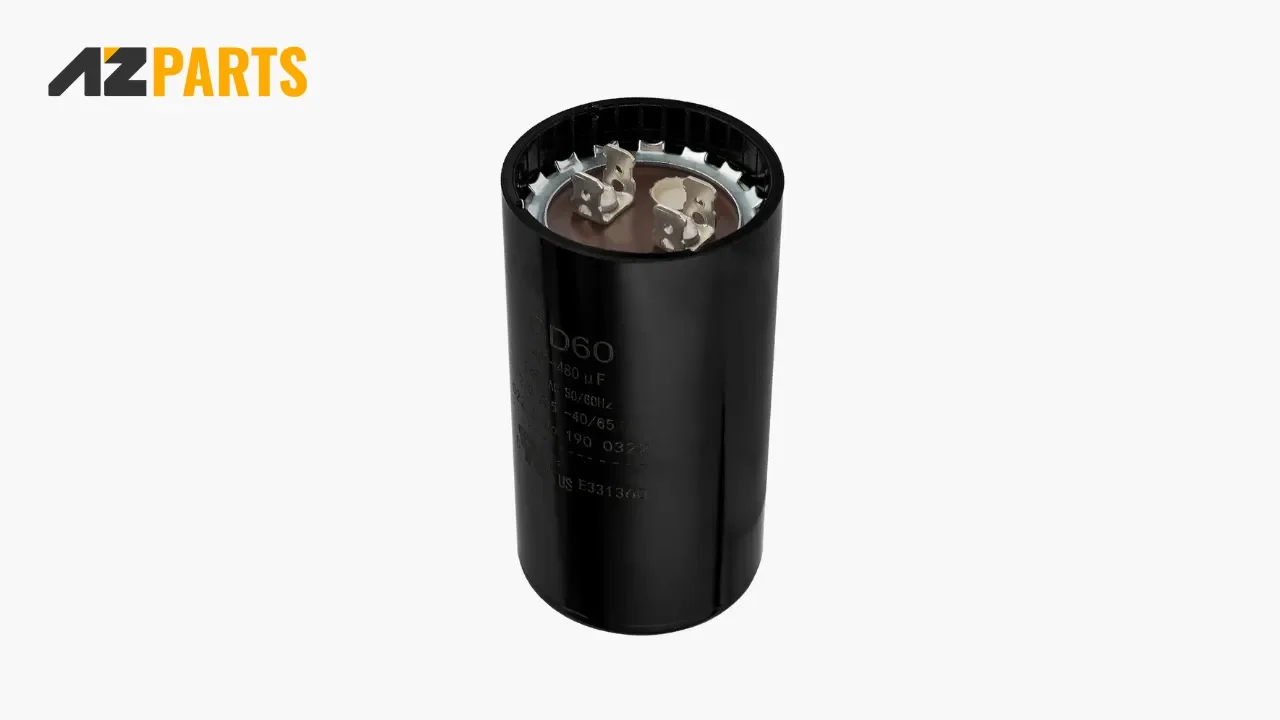
The capacitor is an essential component that helps start and stabilize the operation (Source: AZParts)
2. 7 Common Reasons Why Your AC Is Blowing Hot or Hot Air
When an air conditioner blows warm or hot air instead of cool air, it’s usually a sign that something in the system isn’t working properly. Identifying the root cause early can help you fix the issue quickly and avoid costly repairs. Below are seven of the most common reasons behind this problem:
2.1. Faulty Thermostat
The thermostat regulates the temperature in your room by signaling the compressor to turn on when the temperature rises above the set point. If the thermostat is faulty, misreads the room temperature, or is set to the wrong mode (such as fan mode instead of cool), the air conditioner might not activate the cooling function. As a result, it may only blow out room-temperature air. This is a common and easily fixable issue if caught early.
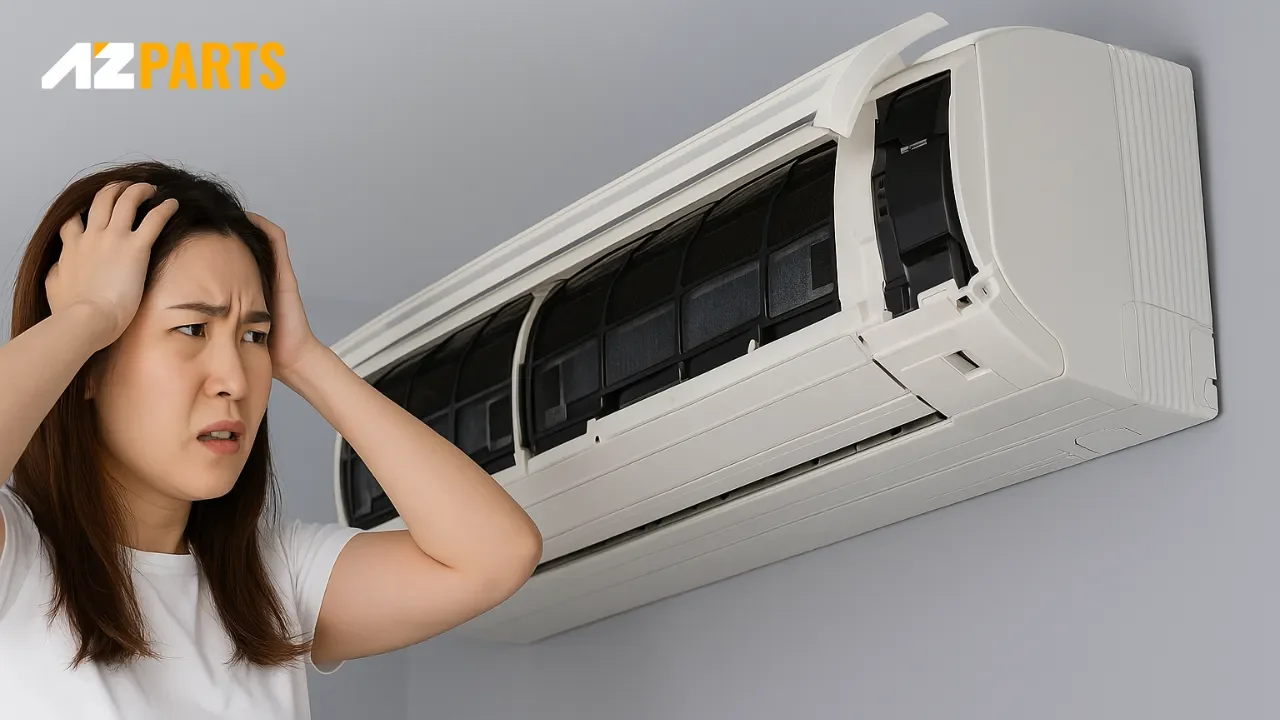
A faulty or incorrectly set thermostat can prevent the air conditioner from cooling (Source: AZParts)
2.2. Tripped Breaker or Electrical Surge
If the circuit breaker is tripped, wires are loose, or the power supply is unstable, critical components like the compressor or outdoor fan may not operate. In this case, the unit may still blow air but won’t produce any cooling, making it feel like warm air is being circulated. Checking the power supply, plug, and breaker should be one of the first steps you take.
2.3. A Clogged Line and Water Build up
Air conditioners naturally produce condensation during operation. If the drain line is blocked by dust, mold, or debris, the water can’t flow out and may build up inside the indoor unit. This not only causes leaking but also reduces the system’s ability to cool effectively. In some cases, it may even cause the unit to shut off suddenly or blow only damp, lukewarm air.
2.4. Dirty Air Filters
The air filter is designed to trap dust and bacteria before the air passes through the cooling coil. Over time, dirt builds up and restricts airflow, preventing the unit from cooling the room efficiently. The air conditioner may then blow warm or weak air. Cleaning the filter regularly, ideally every one to two months can help maintain cooling performance.
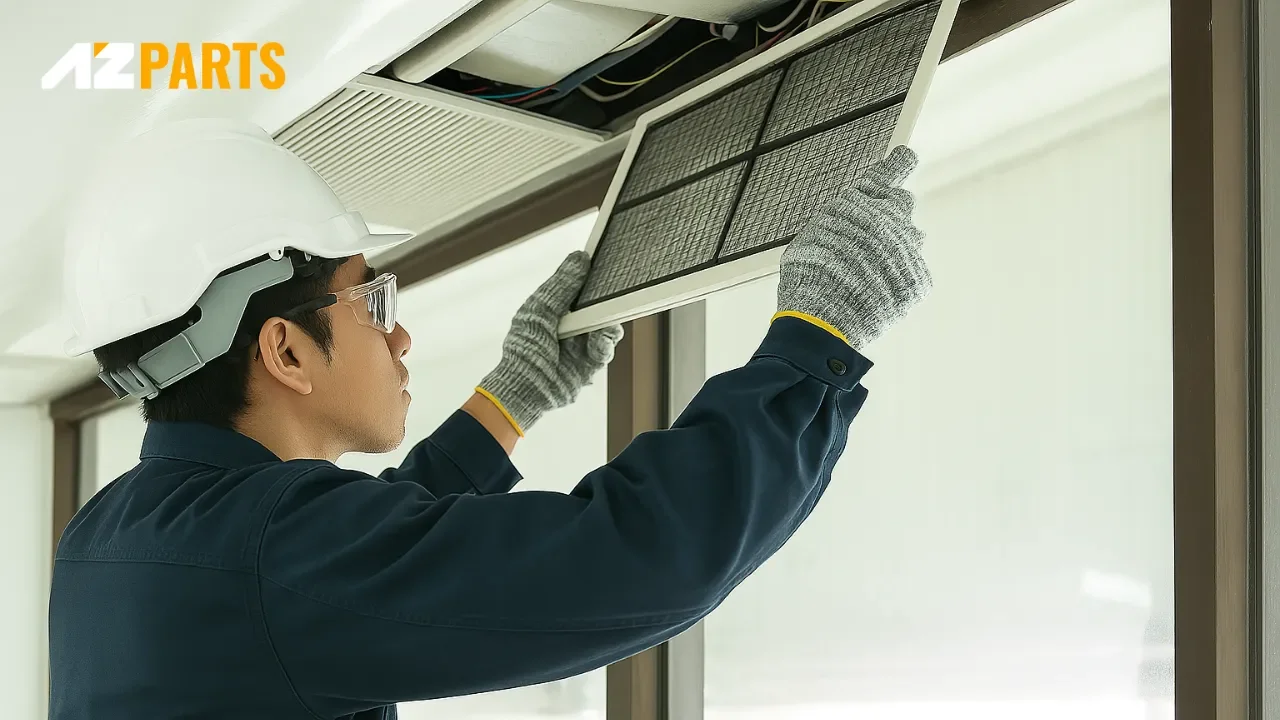
The air filter is designed to trap dust and bacteria before the air passes through the cooling coil (Source: AZParts)
2.5. Refrigerant Leak
Refrigerant (cooling gas) plays a crucial role in absorbing and releasing heat during the cooling cycle. If there’s a leak due to a punctured pipe, a loose valve, or poor installation, the pressure will drop and the system will lose its cooling ability. The unit may still blow air, but it will be warm or only slightly cool. Refrigerant issues are technical and should be handled by a qualified technician who can refill the gas and fix the leak.
2.6. Blocked vents
If the air vents are blocked by dust buildup, furniture, or improper installation, cool air cannot circulate properly. Trapped air inside the unit may cause it to overheat or operate inefficiently. You might feel that the room is still hot even though the air conditioner is running. Keeping the airflow clear and unobstructed greatly improves cooling efficiency.
2.7. Broken condenser fan
The outdoor unit is responsible for releasing the heat absorbed from inside the room. The condenser fan blows air across the condenser coils to help with this process. If the fan is broken, weak, or jammed due to dirt, the refrigerant will not be cooled down properly. As a result, it won’t return to the evaporator at the correct temperature for cooling. The indoor unit may continue to run, but without effective heat exchange, the system can overheat or shut down.
3. How To Troubleshoot AC Blowing Hot Air Yourself?
If your air conditioner starts blowing warm air or doesn’t cool as effectively as before, there’s no need to call a technician right away. In many cases, the issue comes from something simple that you can check and fix yourself at home.
Check the cooling mode setting
First, make sure the air conditioner is set to cooling mode (Cool). If it’s set to fan mode (Fan) or dehumidifying mode (Dry), it will only blow air without cooling the room. Switch it back to Cool mode and set the temperature lower than the current room temperature to see if it starts cooling again.
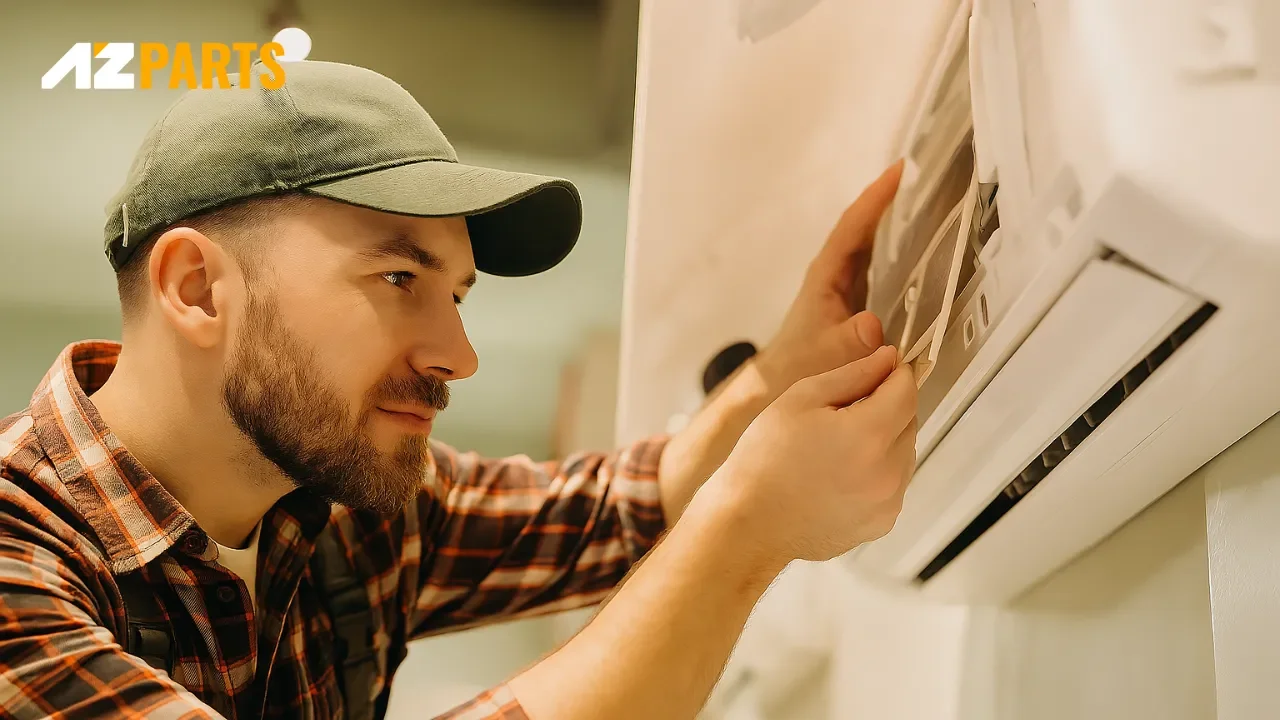
Check the cooling mode setting (Source: AZParts)
Check the power supply
An unstable power source or a tripped circuit breaker can also affect how your AC runs. Try turning the unit off, checking the power plug and breaker, then turning it back on after a few minutes. If the outdoor unit doesn’t run, the system might be facing a deeper technical issue.
Clean the air filter
A dirty filter can block airflow, making the air conditioner weak or unable to cool the room. You can open the indoor unit cover, remove the filter, rinse it with clean water, let it dry, and place it back. Cleaning the filter every one to two months helps maintain proper performance.
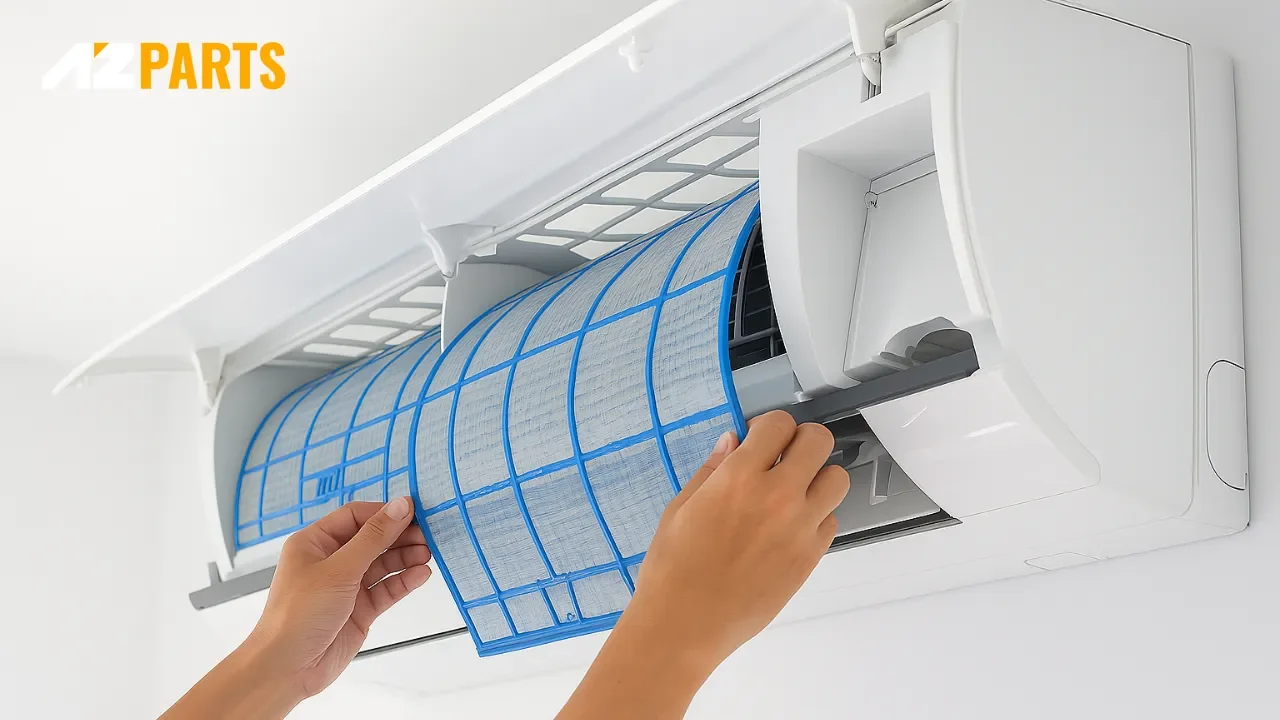
A dirty filter can block airflow, making the air conditioner weak or unable to cool the room (Source: AZParts)
Check the outdoor unit (condenser)
The outdoor unit is usually installed outside the building. Check if the fan is spinning and if you can hear the compressor running. If the fan isn’t moving or no warm air is being released, the capacitor or motor may be faulty. In this case, it’s best to call a technician.
Check the drain pipe for clogs
If water is leaking from the indoor unit or building up inside, the drain pipe may be blocked. This can reduce cooling efficiency and even shut the system off. You can try clearing it gently using a specialized cleaning tool or request a professional cleaning service.
Keep the room sealed and avoid direct sunlight
A room with open doors, windows, or direct sunlight will make the air conditioner work harder with less effect. Draw the curtains, close all doors and windows, and reduce heat sources in the room to help the unit cool more effectively.
When to call a technician
If you’ve tried all the above but the unit still isn’t cooling, it might be due to a refrigerant leak, a faulty outdoor fan, capacitor issues, or a malfunctioning sensor. These are technical problems that should be handled by a qualified technician. Avoid dismantling the unit or refilling refrigerant on your own, as it could cause more serious damage.
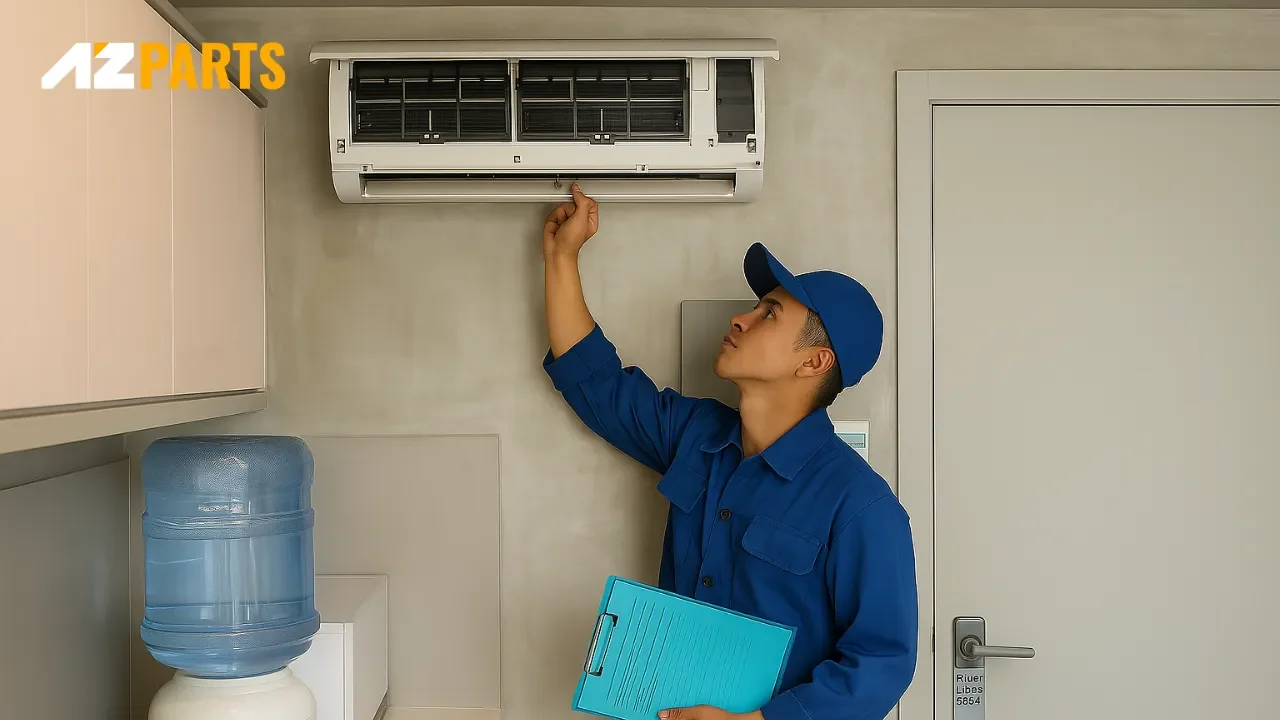
Technical issues that are more complex should be handled by a qualified technician (Source: AZParts)
4. Best Tips to Prevent My AC From Blowing Warm Air In The Future
To avoid having your air conditioner blow warm air again, it is important to take care of the unit and use it properly from the start. Here are a few simple yet effective tips to keep your AC running cool and stable over time.
Clean your air conditioner regularly
The indoor unit and air filters should be cleaned on a regular basis, ideally once every one to two months. This helps improve airflow, speeds up cooling, and reduces electricity consumption. If too much dust builds up, it can block the airflow and weaken the cooling ability of the system.
Schedule full maintenance once or twice a year
In addition to regular cleaning at home, you should call a technician to perform a full checkup. This includes inspecting the refrigerant level, outdoor unit, capacitor, copper pipes, fan, and sensors. Regular servicing helps detect issues early and prevents costly damage.
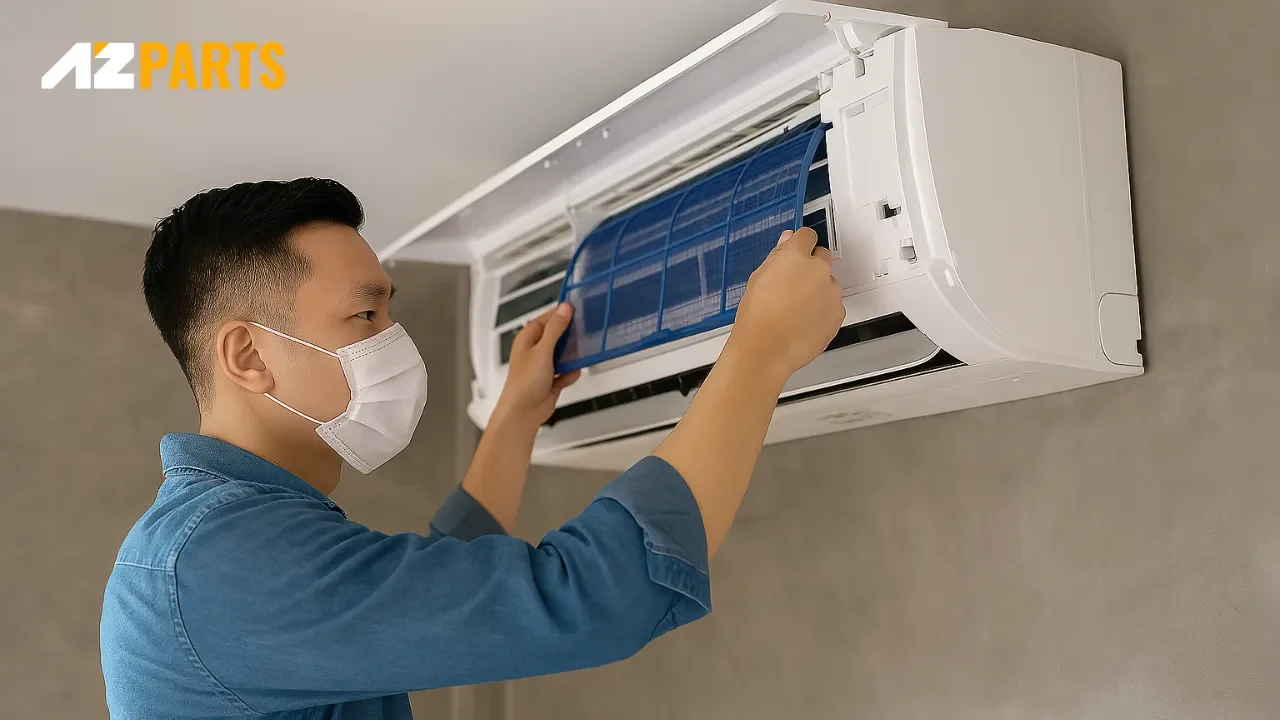
Schedule full maintenance once or twice a year (Source: AZParts)
Use the right air conditioner capacity for your room
If the AC is too small for the room, it will have to run continuously without cooling the space properly. This leads to overload and may damage the unit. For example, a room smaller than fifteen square meters should use a one-horsepower AC unit for the best result.
Keep the room closed and reduce heat exposure
Your air conditioner works better when it does not have to deal with outside heat or strong sunlight. Make sure the room is fully closed, cover the windows with curtains, and avoid placing heat-generating appliances near the unit while it is operating.
Avoid running the air conditioner all day
Just like any machine, an AC needs rest. You should set a timer to turn it off when not needed or allow breaks between long usage periods. This helps save energy and extends the life of the unit.
When an air conditioner starts blowing warm air, it can be uncomfortable, especially during hot weather. Fortunately, most causes are simple, such as incorrect settings, dirt buildup, or worn-out components. With basic knowledge and a few quick checks, you can handle many of these issues on your own and avoid unnecessary repair costs.
In cases where the problem is caused by a damaged part, such as a faulty capacitor, a broken fan, or a malfunctioning sensor, replacing it with a reliable component is essential to keep the system running properly. AZParts offers a wide selection of genuine air conditioner parts, including AC Capacitors, AC Piercing Valve, AC Port Adapter and Air Conditioner Cover. These parts are compatible with many popular brands on the market. If you are looking for trustworthy replacement parts, AZParts is a dependable choice to ensure your air conditioner stays efficient and lasts longer.
Contact Information:
8 The Green, Ste A, Dover, Delaware 19901-3618, United States
Discover other problems your AC might run into:
Air conditioner
Further Reading
Further Reading





